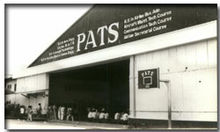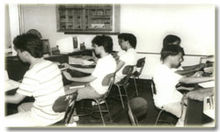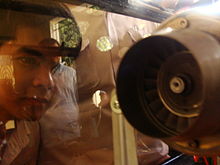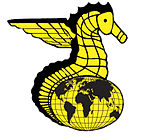- PATTS College of Aeronautics
-
PATTS College of Aeronautics PATTS Kolehiyo ng Eronotika 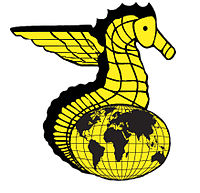
Seal of PATTS College of AeronauticsMotto Fly high, your future is in the skies. Established 1969 Type Private with public-type facilities, staff and administration, nonsectarian Chairman Atty. Ambrosio V. Valdez Jr. President Engr. Jose Eduardo S. Valdez Vice-president Atty. Mercedes S. Gatmaytan Superintendent Jessel Aguisanda Provost Andrei Abadicio Director Severino S. Dumlao Founder Atty. Ambrosio R. Valdez Sr. Academic staff approx. 150 Admin. staff approx. 70 Students 5,936 as of first semester 2010–2011 Location  Lombos Avenue, San Isidro, Parañaque City, Metro Manila, Philippines
Lombos Avenue, San Isidro, Parañaque City, Metro Manila, Philippines
14°28′29.02″N 121°0′22.47″E / 14.4747278°N 121.0062417°ECoordinates: 14°28′29.02″N 121°0′22.47″E / 14.4747278°N 121.0062417°ECampus Urban, 15,000 m² Former names PATS School of Aeronautics Hymn Fly High with PATTS! Colors Royal Blue and Yellow Athletics Basketball, Taekwando, Volleyball Nickname Seahorses, Pattseans Affiliations SAEP, CHED, TESDA, PRC, CAAP, NCRAA Website patts.edu.ph patts.edu.ph 
PATTS College of Aeronautics, also known as Philippine Air Transport & Training Services, is an aeronautical school on Lombos Ave., San Isidro, Paranaque City, Metro Manila, Philippines. Its mission is to provide quality aeronautical education for Filipinos and to help its graduates in the labor market. It was founded by Atty. Ambrosio R. Valdez Sr., for whom the school's gymnasium hall was named.
Contents
History
This article is about general aspects of water. For a detailed discussion of its properties, see Properties of water. For other uses, see Water (disambiguation).
Water in three states: liquid, solid (ice), and (invisible) water vapor in the air. Clouds are accumulations of water droplets, condensed from vapor-saturated air.Water is a chemical substance with the chemical formula H2O. A water molecule contains one oxygen and two hydrogen atoms connected by covalent bonds. Water is a liquid at ambient conditions, but it often co-exists on Earth with its solid state, ice, and gaseous state (water vapor or steam). Water also exists in a liquid crystal state near hydrophilic surfaces.[1][2] Under nomenclature used to name chemical compounds, Dihydrogen monoxide is the scientific name for water, though it is almost never used.[3]
Water covers 70.9% of the Earth's surface,[4] and is vital for all known forms of life.[5] On Earth, 96.5% of the planet's water is found mostly in oceans; 1.7% in groundwater; 1.7% in glaciers and the ice caps of Antarctica and Greenland; a small fraction in other large water bodies, and 0.001% in the air as vapor, clouds (formed of solid and liquid water particles suspended in air), and precipitation.[6][7] Only 2.5% of the Earth's water is freshwater, and 98.8% of that water is in ice and groundwater. Less than 0.3% of all freshwater is in rivers, lakes, and the atmosphere, and an even smaller amount of the Earth's freshwater (0.003%) is contained within biological bodies and manufactured products.[6]
Water on Earth moves continually through the hydrological cycle of evaporation and transpiration (evapotranspiration), condensation, precipitation, and runoff, usually reaching the sea. Evaporation and transpiration contribute to the precipitation over land.
Safe drinking water is essential to humans and other lifeforms. Access to safe drinking water has improved over the last decades in almost every part of the world, but approximately one billion people still lack access to safe water and over 2.5 billion lack access to adequate sanitation.[8] There is a clear correlation between access to safe water and GDP per capita.[9] However, some observers have estimated that by 2025 more than half of the world population will be facing water-based vulnerability.[10] A recent report (November 2009) suggests that by 2030, in some developing regions of the world, water demand will exceed supply by 50%.[11] Water plays an important role in the world economy, as it functions as a solvent for a wide variety of chemical substances and facilitates industrial cooling and transportation. Approximately 70% of the fresh water used by humans goes to agriculture.[12]
Contents 1 Chemical and physical properties 2 Taste and odor 3 Distribution in nature 3.1 In the universe 3.2 Water and habitable zone 4 On Earth 4.1 Water cycle 4.2 Fresh water storage 4.3 Sea water 4.4 Tides 5 Effects on life 5.1 Aquatic life forms 6 Effects on human civilization 6.1 Health and pollution 6.2 Human uses 6.2.1 Agriculture 6.2.2 As a scientific standard 6.2.3 For drinking 6.2.4 Washing 6.2.5 Transportation 6.2.6 Chemical uses 6.2.7 Heat exchange asdsad 6.2.8 Fire extinction 6.2.9 Recreation 6.2.10 Water industry 6.2.11 Industrial applications 6.2.12 Food processing 7 Water law, water politics and water crisis 8 In culture 8.1 Religion 8.2 Philosophy 8.3 Literature 9 See also 9.1 Other topics 10 References 11 Further reading 12 External links
Academic program
PATTS course offerings are recognized by the Commission of Higher Education (CHED) and the Technical Education and Skills Development Authority (TESDA). The Civil Aviation Authority of the Philippines (CAAP) certifies that PATTS is a Aircraft Maintenance School, rated for Airframe and Power plant. Aircraft frames and powerplants are available for PATTS students to work on, dismantle, and assemble in the laboratories under the direct supervision of duly licensed personnel. PATTS graduates are required to undergo On-the-Job training with aviation companies which include Philippine Airlines, Air Philippines, Cebu Pacific, Philippine Aeroscope Development Corporation and the Philippine Air Force. This training prepares graduates of PATTS for integration into the industry. PATTS takes pride that a good number of their graduates have already passed the required examinations with the Aeronautical Engineering Licensure Examination, Air Transportation Office and the Radio Licensure Examination.
Vision
To become the CENTER of EXCELLENCE in Aviation Education. In order to attain this vision, PATTS College has strengthened its faculty through its competency-based training, including research and development programs, streamlined its curricula to be responsive and relevant to the needs of the industry and has painstakingly invested in a new campus that would offer the best in facilities.
Mission
To provide quality Aviation Education and to assist our graduates in the labor market. In order to achieve its mission, PATTS College employ experienced instructors and practitioners from the industry and has intensified its academe — industry linkages, and broaden its On-the-Job-Training and placement Program.
Courses offered
- Bachelor of Science in Aeronautical Engineering (BSAeE)
- Bachelor of Science in Industrial Engineering (BSIE)
- Bachelor of Science in Air Transportation (BSAT)
- Bachelor of Science in Aircraft Maintenance Technology (BSAMT)
- Bachelor of Science in Avionics Technology (BSAvTech)
- Bachelor of Science in Airline Business Administration (BSABA)
- Bachelor of Science in Tourism Management (BSTM)
- Bachelor of Science in Hotel & Restaurant Management (BSHRM)
- Aircraft Technician Course (ATC)
Publications
Both publications are geared towards their aims of training staffers to develop their skills and creativity in the field of writing and to enhance leadership and capabilities to interact with fellow PATTSEANS.
Aeroscope magazine
Aeroscope magazine is the official publication of PATTS College of Aeronautics. It is published quarterly to provide the readers with the latest updates in the aviation industry and inform them about school-related activities. It operates independently from all other units in the school campus. It is essentially a technical magazine and is published in English and Filipino.
Contrails yearbook
The Contrails yearbook is a priceless souvenir of the gt j jyjkjkkkykkuykkykkykkykkykykykkkykkykykykkkpast. Pictures and precious moments are gathered to form a book of memories. They capture the most momentous and touching periods of the students’ lives, especially the graduating batch.
Student organizations
The following are recognized organizations in the campus.
Course organizations
- Aeronautical Engineering Research Organization (AERO)
- Bifilar Society of Aircraft Maintenance Troubleshooters (BSAMT)
- Society of PATTS Industrial Engineering Students (SPIES)
- Guild of Air Transportation Students (GATS)
- PATTS Avionics Society (PAVIOS)
- Aviation Training Centre (ATC)
- PATTS Tourism Society (PTS)
- Airline Business Administration Society (ABASOC)
- Community of Hospitality in Education of Food and Services (CHEFS)
Non-course organizations
- PATTS Student Council (PSC)
- PATTS ROTC
- PATTS Rotaract Club (PRC)
- PATTS Guild of Literary Arts and Crafts (PGLAC)
- PATTS Math and Science Society (PMSS)
- PATTS Universal League of Singing Enthusiasts (PULSE)
- PATTS S.I.K.A.T. (Sining, Imahinasyon, Kultura, Arte at Talento)
- PATTS Rescue Team (PRT)
- PATTS Body Building Club (PBBC)
- PATTS Martial Arts Club (PMAC)
- PATTS Dance Club
- PATTS Campus Christian Ministry (PCCM)
- Litratista
- PATTS PATTS Alliance of Music Artist (PAMA)
College seal
Emblazoned in the middle of the PATTS corporate crest or college emblem is a figure that elicits more than a passing interest from people. The image of a seahorse is etched clearly and faultlessly. To this figure, questions abound. What has a seahorse to do with an aeronautical institution, and a creature seemingly in flight? The answer is in a founders dream of PATTS that is now translated into a legend of what hard work, dedicated instructors and visionary management can do, all with cutting-edge knowledge in technology that has brought them to success all over the world. The seahorse has wings but cannot fly. Students who enroll at PATTS may have the potential wings but cannot use them. They are trained to harness their potential; when they graduate they are winged to fly and search for their future in the skies.
PATTS founder Atty. and Engr. Ambrosio R. Valdez, Sr. had a vision of the future premised on achievement. “If we can make a seahorse fly, there is no reason why we cannot make anyone or anything else fly.”
Alma mater hymn

"Fly High with PATTS!"
Time has come leading you
To search for your goal
Guiding your hand; signing upon;
Believing you can...
Together we stand, you and I
Hand in hand we start
Moving on, journeying together
Soaring towards the sky!
Refrain:
A mind to start,
A will to move,
A wing to fly!
Chorus:
Fly high with PATTS!
Soar with your dreams
Open your eyes
Hone all your skills
Fly high with PATTS!
Take off and glide
Work with devotion
Always be the best
Fly high with PATTS!
Nothing compares
Second to none
The leader among all
Guiding you to the rest of your dreams
'til you commence
(Repeat Refrain and Chorus)
Final Chorus:
Fly high with PATTS!
Soar with your dreams
Open your eyes
Hone all your skills
Work with devotion
Always be the best
Fly high with PATTS!Notable alumni
- Isabel Granada, actress
- Paulie Yllana, actor
- Engr. Elmer A. Chavez, consultant, Cebu Pacific Air
- Engr. Fernando C. Fajardo Jr., technical manager, Airphil Express
- Engr. Redentor C. Malia, general manager of MACHSCAN Technical Services Inc.
See also
External links
- patts.edu.ph official website
 Aviation School in the PhilippinesAirlink International Aviation School • FEATI University • PATTS College of Aeronautics • Philippine State College of AeronauticsCategories:
Aviation School in the PhilippinesAirlink International Aviation School • FEATI University • PATTS College of Aeronautics • Philippine State College of AeronauticsCategories:- Universities and colleges in the Philippines
- Higher education in the Philippines
- Aviation schools in the Philippines
Wikimedia Foundation. 2010.

